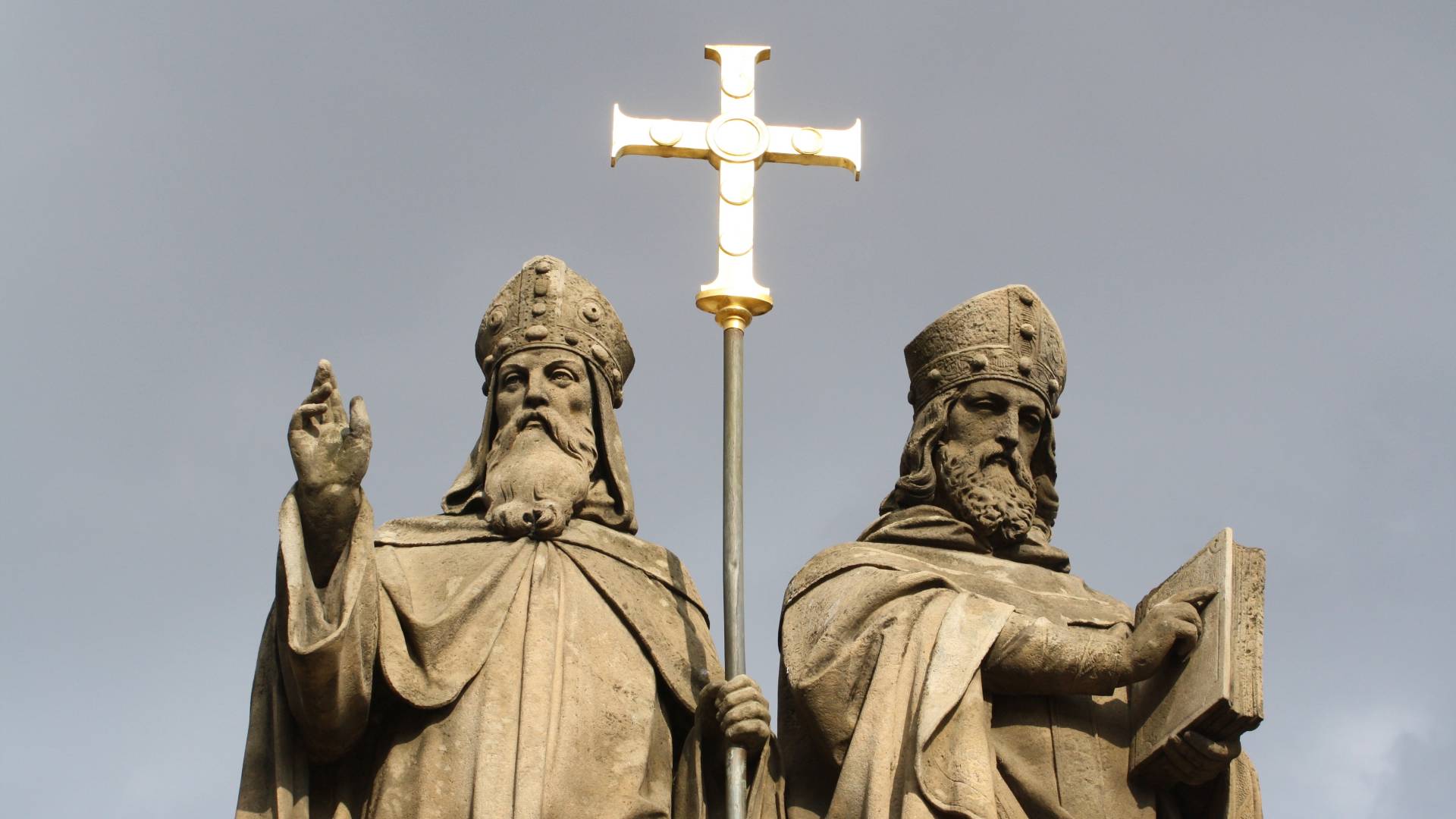

Pope's General Audience - October 25, 2023
Pope Francis
Wednesday, October 25, 2023

Statue of Saints Cyril and Methodius in Trebíc, Czechia. Photo by Jirí Sedlácek - Frettie, CC BY-SA 3.0, via Wikimedia Commons.
During today's General Audience, Pope Francis reflected on the mission of Sts Cyril and Methodius to the Slavic people. He said that "faith must be inculturated and the culture evangelized." Read the full text of his address below:Dear brothers and sisters, good morning! Today I will talk to you about two brothers, very famous in the east, to the point of being called “the apostles of the Slavs”: Saints Cyril and Methodius. Born in Greece in the ninth century into an aristocratic family, they renounced a political career to devote themselves to monastic life. But their dream of a secluded existence was short-lived. They were sent as missionaries to Great Moravia, which at the time included various peoples, already partly evangelized, but among whom many pagan customs and traditions survived. Their prince asked for a teacher to explain the Christian faith in their language. Cyril and Methodius' first task was therefore to study the culture of those peoples in depth. Always the same refrain: faith must be inculturated and the culture evangelized. Inculturation of faith, evangelization of culture, always. Cyril asked if they have an alphabet; they told him they did not. He replied: “Who can write a speech on water?” Indeed, to proclaim the Gospel and to pray, one needed a proper, suitable, specific tool. So, he invented the Glagolitic alphabet. He translated the Bible and liturgical texts. People felt that the Christian faith was no longer "foreign," but rather it became their faith, spoken in their mother tongue. Just think: two Greek monks giving an alphabet to the Slavs. It is this openness of heart that rooted the Gospel among them. Those two had no fear, they were courageous. Very soon, however, some opposition emerged on the part of some Latins, who saw themselves deprived of their monopoly on preaching to the Slavs; that fight within the Church, it is always that way. Their objection was religious, but only in appearance: God can be praised, they said, only in the three languages written on the cross: Hebrew, Greek and Latin. They had a closed mindset, to defend their own autonomy. But Cyril responded forcefully: God wants every people to praise Him in their own language. Together with his brother Methodius, he appealed to the Pope and the latter approved their liturgical texts in the Slavic language. He had them placed on the altar of the Church of Saint Mary Major, and sang with them the Lord’s praises according to those books. Cyril died a few days later, and his relics are still venerated here in Rome, in the Basilica of Saint Clement. Methodius, instead, was ordained a bishop and sent back to the Slav territories. Here he would suffer a great deal: he would even be imprisoned, but, brothers and sisters, we know that the Word of God was not shackled and spread throughout those peoples. Looking at the witness of these two evangelizers, whom Saint John Paul II chose as co-patrons of Europe and on whom he wrote the Encyclical Slavorum Apostoli, let us look at three important aspects. First of all, unity. The Greeks, the Pope, the Slavs: at that time, there was an undivided Christianity in Europe, which collaborated in order to evangelize. A second important aspect is inculturation, of which I said something earlier: evangelizing the culture and inculturation show that evangelization and culture are closely connected. One cannot preach the Gospel in an abstract, distilled way, no: the Gospel must be inculturated and it is also an expression of culture. A final aspect is freedom. Preaching requires freedom, but freedom always needs courage; a person is free to the extent that they are courageous and do not let themselves be shackled by many things that take away their freedom. Brothers and sisters, let us ask Saints Cyril and Methodius, apostles of the Slavs, that we may be instruments of “freedom in charity” for others. To be creative, to be constant and to be humble, with prayer and with service. ______________________________________________ APPEAL I think always of the grave situation in Palestine and Israel: I encourage the release of the hostages and the entry of humanitarian aid in Gaza. I continue to pray for those who suffer, and to hope for paths of peace in the Middle East, in beleaguered Ukraine, and in other regions afflicted by war. I remind you all that the day after tomorrow, Friday 27 October, will be a day of fasting, prayer and penance: at 18.00, in Saint Peter’s Square, we will gather together to implore peace in the world. Text courtesy of Libreria Editrice Vaticana
Related Articles:
>>
SUPPORT LABEL
$50
$100
$150
$250
OTHER AMOUNT
DONATE
Receive our newsletters
Stay Connected
Receive our newsletters

Stay Connected









